Educational psychology is a fascinating field that delves into the intricate dynamics of human development, cognition, and the theory and practice of teaching and learning. By examining the complex interplay between learners and their environments, educational psychologists contribute valuable insights to enhance educational programs and create effective learning environments.
These experts, armed with a solid foundation in psychology, study the emotional, cognitive, and social aspects of human learning. They work closely with students, teachers, parents, and administrators to improve teaching methods, develop curriculum, and create supportive classroom environments.
By evaluating educational psychology theories and applying research findings, educational psychologists help shape the future of education. Their work involves addressing diverse aspects, including counseling psychology, career paths, and the impact of social and cultural factors on learning.
Key Takeaways:
- Educational psychology focuses on understanding the emotional, cognitive, and social aspects of human learning.
- Educational psychologists collaborate with various stakeholders to improve teaching methods and enhance learning outcomes.
- The field encompasses a range of theories, including behaviorism, cognitivism, constructivism, experientialism, and social contextual learning theories.
- Career paths in educational psychology include research, teaching, counseling, and educational administration.
- Educational psychology contributes to creating engaging and supportive learning environments.
Key Theories in Educational Psychology
Educational psychology is grounded in several key theories that shape understanding and practice. These theories provide valuable insights into how people learn and influence educational practices. Let’s take a closer look at some of the key theories in educational psychology:
Behaviorism
Behaviorism is a theory that focuses on observable behavior and environmental stimuli as the basis for learning. It suggests that learning is a result of associations between stimuli and behaviors. Behaviorist learning theories emphasize the use of positive and negative reinforcement to encourage or discourage specific behaviors. Key theorists in behaviorism include Edward Thorndike, Ivan Pavlov, John B. Watson, and B.F. Skinner.
Cognitivism
Cognitivism explores the mental processes involved in learning, such as memory, perception, and problem-solving. This theory suggests that learning is influenced by cognitive processes and encourages educators to consider how learners think and process information. Key theorists in cognitivism include Jean Piaget, Jerome Bruner, and Robert Mills Gagne.
Constructivism
Constructivism emphasizes the active construction of knowledge based on prior experiences. It proposes that learners actively construct their understanding of the world by integrating new information with their existing knowledge. Key theorists in constructivism include John Dewey, Jean Piaget, and Lev Vygotsky. Constructivism highlights the importance of instructional scaffolding and the zone of proximal development in supporting learners’ knowledge construction.
Experientialism
Experientialism recognizes the importance of personal experiences in learning. It holds that learners construct knowledge and meaning through their own experiences. This theory emphasizes a learner-centered approach and focuses on creating meaningful learning experiences that connect to the learner’s prior knowledge and interests.
Social Contextual Learning Theories
Social contextual learning theories explore how social and cultural factors influence learning. These theories highlight the role of social interactions, cultural diversity, and communities of practice in the learning process. They emphasize that knowledge is co-constructed within social and cultural contexts.
The integration of these key theories in educational psychology provides educators with a comprehensive understanding of how individuals learn and grow. By applying these theories in educational practice, educators can create effective learning environments that cater to the diverse needs of learners.
To further understand the different perspectives of educational psychology theories, let’s take a look at the following comparison table:
| Theory | Focus | Main Theorists |
|---|---|---|
| Behaviorism | Observable behavior and environmental stimuli | Edward Thorndike, Ivan Pavlov, John B. Watson, B.F. Skinner |
| Cognitivism | Mental processes involved in learning | Jean Piaget, Jerome Bruner, Robert Mills Gagne |
| Constructivism | Active construction of knowledge based on prior experiences | John Dewey, Jean Piaget, Lev Vygotsky |
| Experientialism | Personal experiences in learning | – |
| Social Contextual Learning Theories | Social and cultural factors influencing learning | – |
Behaviorism in Educational Psychology
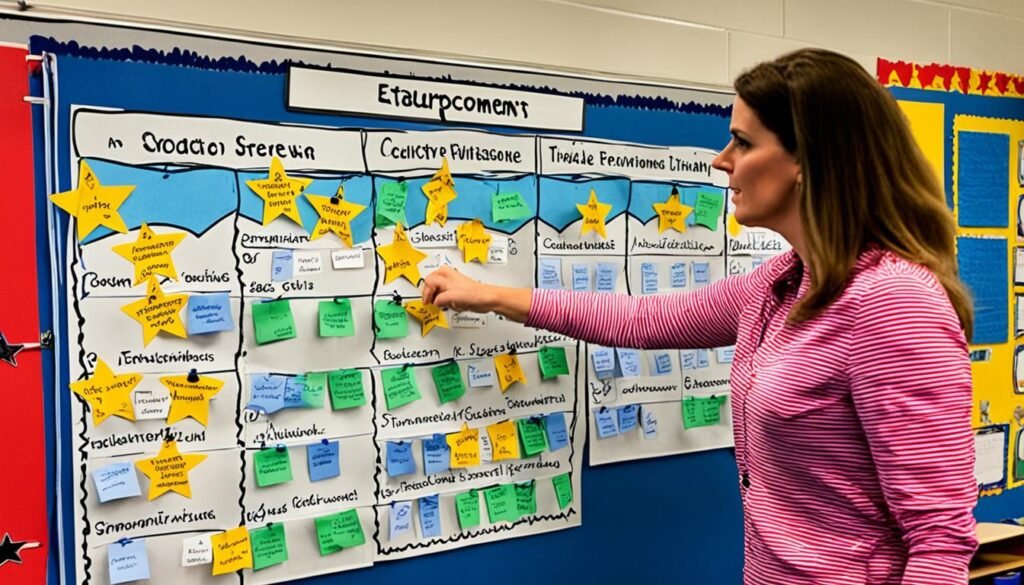
Behaviorism is a fundamental theory in educational psychology that focuses on observable behavior and the influence of environmental stimuli. This theory suggests that learning is a result of the association between stimuli and behaviors. Key theorists who have contributed significantly to behaviorism include Edward Thorndike, Ivan Pavlov, John B. Watson, and B.F. Skinner.
Behaviorist learning theory posits that positive reinforcement encourages the repetition of desired behaviors, while negative reinforcement discourages unwanted behaviors. This theory has significant implications for behavior modification and behavior therapy in educational settings.
“Give me a dozen healthy infants, well-formed, and my own specified world to bring them up in, and I’ll guarantee to take any one at random and train him to become any type of specialist I might select — doctor, lawyer, artist, merchant-chief, and, yes, even beggar-man and thief…” – John B. Watson
Behaviorism is often employed in educational psychology to shape and modify behavior through various techniques. Behavior modification focuses on using positive and negative reinforcement to encourage or discourage specific behaviors. Behavior therapy, on the other hand, utilizes behaviorist principles to address psychological disorders and improve mental health.
Key Theorists in Behaviorism
The field of behaviorism in educational psychology has been shaped by notable theorists who have explored the relationship between behavior, stimuli, and learning outcomes. These key theorists include:
| Theorist | Contributions |
|---|---|
| Edward Thorndike | Introduced the concept of the law of effect, which states that behaviors followed by satisfying consequences are more likely to be repeated. |
| Ivan Pavlov | Developed classical conditioning, demonstrating how a neutral stimulus can elicit a response through repeated association with a natural stimulus. |
| John B. Watson | Pioneered behaviorism as a scientific field, focusing on observable behavior and environmental factors as the primary influences on learning. |
| B.F. Skinner | Studied operant conditioning, which involves reinforcing or punishing behaviors to shape learning outcomes, highlighting the importance of consequences. |
Behaviorism has had a significant impact on the field of educational psychology, providing valuable insights into behavior modification, behavior therapy, and the understanding of human learning processes. By studying observable behaviors and the environmental stimuli that influence them, educational psychologists can design effective interventions and strategies to enhance learning outcomes for students.
Cognitivism in Educational Psychology
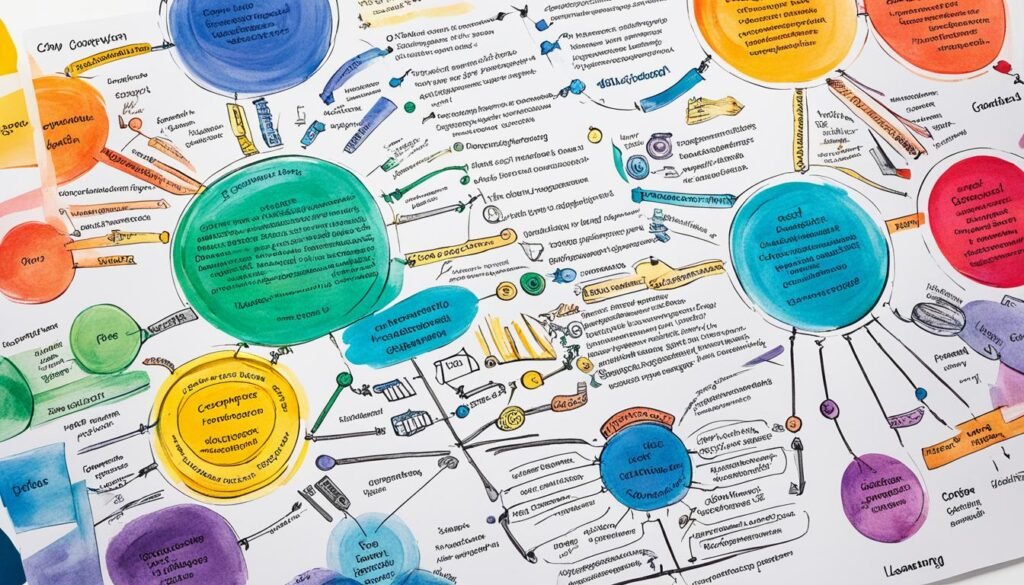
Cognitivism is a prominent theory in educational psychology that focuses on the mental processes involved in learning and knowledge acquisition. It understands that learning goes beyond observable behavior and delves into the cognitive aspects of the learning process.
The key theorists in cognitivism have made significant contributions to understanding cognitive psychology and its implications for education. Some of the notable theorists include:
- Jean Piaget
- Jerome Bruner
- Robert Mills Gagne
- Marriner David Merill
- Charles Reigeluth
- Roger Schank
These theorists have emphasized the importance of mental processes, such as memory, motivation, reflection, and problem-solving, in the learning experience. According to cognitivism, learners actively process information, make connections, and construct knowledge based on their prior knowledge and experiences.
Cognitivism highlights the role of cognitive psychology in shaping educational practices. By understanding how learners think and process information, educators can design instructional strategies that facilitate meaningful learning and engage students in the subject matter.
“Cognitive psychology teaches us that humans are active participants in the learning process. To create effective learning environments, educators must foster problem-solving skills, critical thinking, and metacognition.”
By recognizing the importance of prior knowledge and experiences, cognitivism also emphasizes the need for scaffolding and bridging new information with existing knowledge. Educators can facilitate knowledge acquisition by providing supportive learning experiences that build upon learners’ prior understanding.
Moreover, cognitivism recognizes the indispensability of problem-solving in the learning process. It acknowledges that learners acquire knowledge not only by passively receiving information but by actively applying it to solve problems and make connections.
Key Theorists in Cognitivism
| Theorist | Contributions |
|---|---|
| Jean Piaget | Pioneered the theory of cognitive development, highlighting the stages of intellectual growth in children. |
| Jerome Bruner | Developed the theories of cognitive growth and spiral curriculum, emphasizing active learning and scaffolding. |
| Robert Mills Gagne | Proposed the conditions of learning and the nine events of instruction, outlining the steps for effective learning. |
| Marriner David Merill | Developed the Component Display Theory, which focuses on organizing and presenting information for effective learning. |
| Charles Reigeluth | Pioneered the Elaboration Theory, emphasizing meaningful learning and the importance of instructional design. |
| Roger Schank | Introduced the concept of script theory and emphasized the role of narrative and storytelling in learning. |
Through the insights provided by cognitivism, educators can design and implement instructional strategies that align with learners’ cognitive processes. By incorporating problem-solving tasks, promoting metacognition, and scaffolding new information, educators can enhance the learning experience and foster deep understanding.
Cognitivism, with its focus on mental processes, has greatly influenced educational psychology and continues to shape educational practices today. By understanding how learners think, process information, and construct knowledge, educators can create dynamic and engaging learning environments that promote effective learning and knowledge acquisition.
Constructivism in Educational Psychology
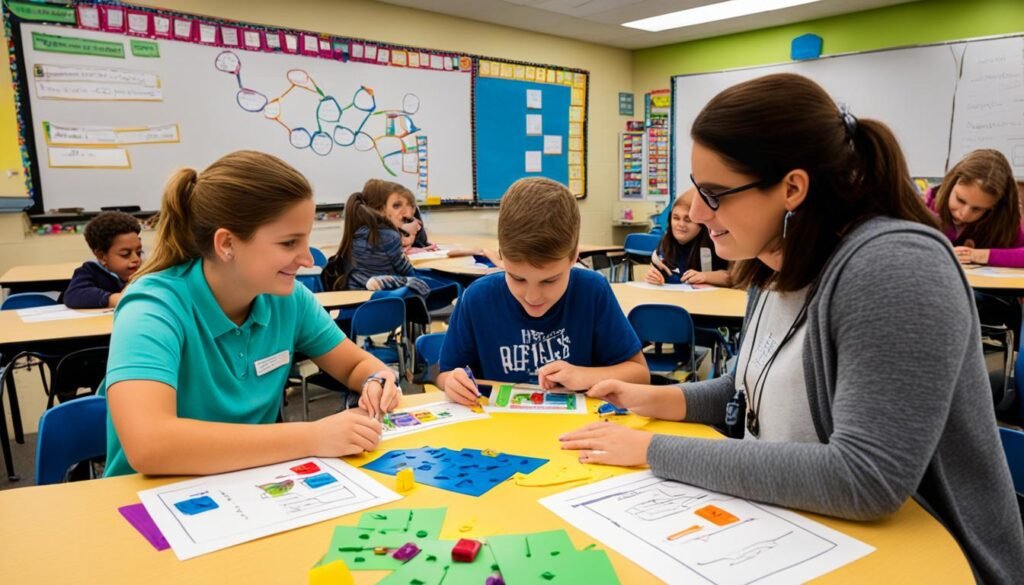
Constructivism is a prominent theory in educational psychology that emphasizes the active role of learners in constructing their knowledge. According to constructivism, knowledge is not simply transmitted from teachers to students but is actively built by learners through their experiences, prior knowledge, and interactions with social and cultural influences. This theory emphasizes that learning is a process of meaning-making in which individuals construct new knowledge based on what they already know.
Key theorists in constructivism include:
- John Dewey
- Jean Piaget
- Lev Vygotsky
- Jerome Bruner
These theorists have made significant contributions to the understanding of how learners construct knowledge and the role of social and cultural influences in the learning process.
Constructivism suggests that learners actively engage in knowledge construction through inquiry, problem-solving, and reflection. It emphasizes the importance of instructional scaffolding, which involves providing support and guidance to learners as they develop new knowledge and skills. Instructional scaffolding helps learners bridge the gap between their current understanding and the desired learning outcomes. It also promotes the development of higher-order thinking skills, critical thinking, and metacognitive abilities.
The zone of proximal development, a concept introduced by Lev Vygotsky, is closely related to constructivism and instructional scaffolding. It refers to the difference between what learners can do independently and what they can achieve with the support of a knowledgeable other, such as a teacher or a peer. The zone of proximal development highlights the importance of providing learners with tasks and activities that are challenging but achievable with appropriate support.
In practice, constructivism encourages educators to design learning experiences that actively engage students, promote active exploration and discovery, and foster collaboration and peer interaction. It also underscores the importance of considering learners’ prior knowledge, cultural backgrounds, and individual interests in instructional design and delivery. By adopting a constructivist approach, educators can create more meaningful and engaging learning environments that support students’ knowledge construction and promote deep understanding.
Benefits of Constructivism in Education
Constructivism offers several benefits for education:
- Enhanced student engagement and motivation: By actively involving students in the learning process, constructivism promotes higher levels of engagement and motivation.
- Deeper understanding: Constructivist approaches encourage students to develop a deep understanding of concepts by connecting new information to their existing knowledge.
- Promotion of critical thinking skills: Constructivism promotes critical thinking skills as students actively explore and analyze information, solve problems, and make connections.
- Development of creativity and problem-solving skills: Constructivist approaches provide opportunities for students to think creatively and develop problem-solving skills.
- Preparation for real-world contexts: By engaging students in authentic, real-world tasks, constructivism prepares them for the challenges they will face beyond the classroom.
“Constructivism emphasizes that learners actively construct their knowledge of the world based on their experiences, prior knowledge, and social and cultural influences.” – John Dewey
As educators continue to explore effective approaches to teaching and learning, constructivism remains a valuable framework for designing engaging and meaningful educational experiences that support students’ knowledge construction and lifelong learning.
| Key Theorists | Main Contributions |
|---|---|
| John Dewey | Emphasized the importance of experiential learning and the value of connecting education with real-life experiences. |
| Jean Piaget | Proposed the stages of cognitive development and highlighted the role of assimilation, accommodation, and equilibration in learning. |
| Lev Vygotsky | Introduced the zone of proximal development and emphasized the role of social interactions and scaffolding in learning. |
| Jerome Bruner | Advocated for the use of scaffolding, spiral curriculum, and discovery learning to promote meaningful learning. |
Experientialism in Educational Psychology

Experientialism, a prominent theory in educational psychology, places a strong emphasis on the role of personal experiences in the learning process. It asserts that learners actively construct knowledge and meaning through their own experiences, fostering a deep and meaningful learning experience.
This learner-centered approach focuses on creating engaging learning experiences that connect to the learner’s personal background, prior knowledge, and interests. By integrating these elements, educators can enhance the relevancy and applicability of the learning content, making it more meaningful and impactful for the learners.
Experientialism recognizes that learners are active participants in the learning process. Instead of passively receiving information, learners actively engage with the material, apply it to real-world contexts, and reflect on their experiences. This active engagement helps facilitate better understanding and retention of knowledge.
Experiential learning is often characterized by hands-on activities, real-world simulations, and problem-solving tasks. By providing opportunities for learners to apply theoretical concepts in practical settings, educators can bridge the gap between theory and practice, enhancing the transfer of learning.
Implementing an experiential approach in educational settings encourages students to explore, critically analyze, and synthesize information. It encourages creativity, independent thinking, and problem-solving skills, empowering learners to become lifelong learners.
“Experiential learning is the bridge that connects theory to practice, empowering learners to apply their knowledge in meaningful ways.” – Educational Psychologist
With its focus on personal experiences, the learner-centered approach of experientialism can foster a deeper understanding of the subject matter, encourage critical thinking skills, and promote a love for learning. By creating meaningful and engaging learning experiences, educators can enhance the overall educational journey for their students.
**Keywords: Experientialism, personal experiences, learner-centered approach, meaningful learning**
Social Contextual Learning Theories in Educational Psychology
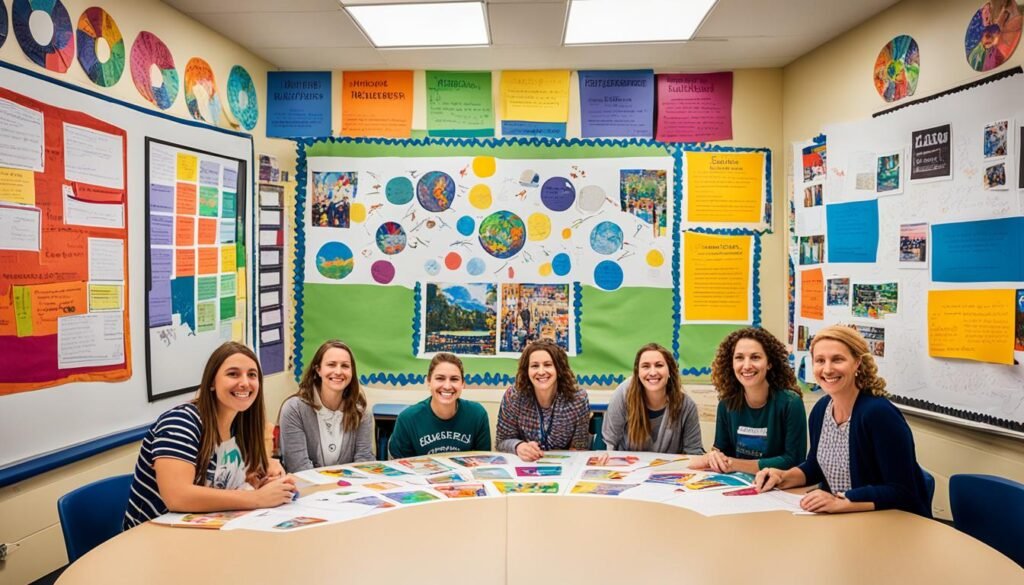
Social contextual learning theories in educational psychology examine the impact of social and cultural factors on the learning process. These theories recognize that learning is not solely an individual endeavor but is shaped by the social and cultural context in which it occurs. By taking into account the influence of social interactions, cultural norms, and community participation, these theories provide valuable insights into effective educational practices.
One prominent theory within social contextual learning is situated learning. Situated learning emphasizes the importance of learning within authentic contexts and real-world situations. According to this theory, knowledge is best acquired and understood when it is applied to relevant and meaningful situations. Situated learning encourages learners to actively participate in the learning process by engaging in hands-on activities and problem-solving tasks.
“Learning is most effective when it takes place in authentic contexts and is embedded in meaningful activities.” – Educational Psychologist
Communities of practice is another key concept within social contextual learning. These communities refer to groups of individuals who share a common interest or profession and regularly engage in joint activities and discussions. By interacting with others who have similar interests or expertise, learners can collaborate, share knowledge, and develop a deeper understanding of the subject matter. Communities of practice provide a supportive and enriching environment for learning and professional growth.
Social contextual learning theories also emphasize the influence of social and cultural factors on the learning process. Cultural diversity and multicultural perspectives are recognized as valuable resources that contribute to a rich and inclusive learning environment. By appreciating and respecting cultural differences, educators can create a classroom climate that values diversity and promotes cross-cultural understanding.
Benefits of Social Contextual Learning Theories:
- Promote active and engaged learning
- Foster collaboration and social interaction
- Enhance the relevance and meaningfulness of learning
- Cultivate cultural awareness and diversity appreciation
- Support the development of real-world skills
Real-World Application:
One practical application of social contextual learning theories is the implementation of project-based learning in the classroom. Project-based learning encourages students to work together on a real-world problem or project, allowing them to apply their knowledge and skills in an authentic context. By collaborating with their peers and tapping into their collective expertise, students not only deepen their understanding but also develop important skills such as communication, critical thinking, and teamwork.
In conclusion, social contextual learning theories in educational psychology recognize the impact of social and cultural factors on the learning process. By considering the influence of situated learning, communities of practice, and cultural diversity, educators can create enriching learning environments that promote active engagement and meaningful learning experiences.
The Role of Educational Psychologists

Educational psychologists play a crucial role in the field of educational psychology, contributing to the improvement of teaching methods, curriculum development, and educational programs. Their diverse career paths encompass roles as researchers, consultants, teachers, and curriculum developers. Here’s an overview of the various ways educational psychologists contribute:
Research
Educational psychologists engage in research to gain a deeper understanding of human learning and cognition. Through empirical studies, they identify effective instructional strategies, learning environments, and interventions that enhance educational outcomes. Their research findings inform evidence-based practices in education.
Consulting
Educational psychologists provide consulting services to schools, educational institutions, and organizations. They collaborate with educators, administrators, and parents to improve teaching methods, develop inclusive educational programs, and support students with special needs. By offering expert guidance, they help optimize learning environments and facilitate positive educational experiences.
Teaching
Many educational psychologists pursue teaching roles in schools, colleges, and universities. As educators, they share their expertise in educational psychology theories, teaching strategies, and instructional design. They help future teachers understand how to apply psychological principles in the classroom and create engaging learning experiences that promote student achievement.
Curriculum Development
Educational psychologists contribute to curriculum development by designing instructional materials, developing learning objectives, and aligning educational content with students’ developmental needs. They ensure that curricula are evidence-based, culturally responsive, and promote active learning. By addressing the diverse learning needs of students, they enhance the effectiveness of educational programs.
Special Education
Educational psychologists are instrumental in supporting students with special needs. They assess students’ learning difficulties, provide intervention strategies, and collaborate with teachers to develop Individualized Education Programs (IEPs). Their expertise ensures that students with disabilities receive appropriate accommodations and support to maximize their educational potential.
Organizational Learning
Educational psychologists contribute to enhancing organizational learning by working with school administrators and educational leaders. They analyze organizational structures, processes, and cultures to identify areas for improvement and development. By implementing strategies that promote collaboration, professional growth, and effective communication, they foster a culture of continuous learning and development within educational institutions.
Educational psychologists play a vital role in shaping the field of educational psychology. With their expertise in research, consulting, teaching, curriculum development, special education, and organizational learning, they contribute to creating inclusive and effective educational environments that maximize student potential.
The Influence of Educational Psychology on Learning Environments
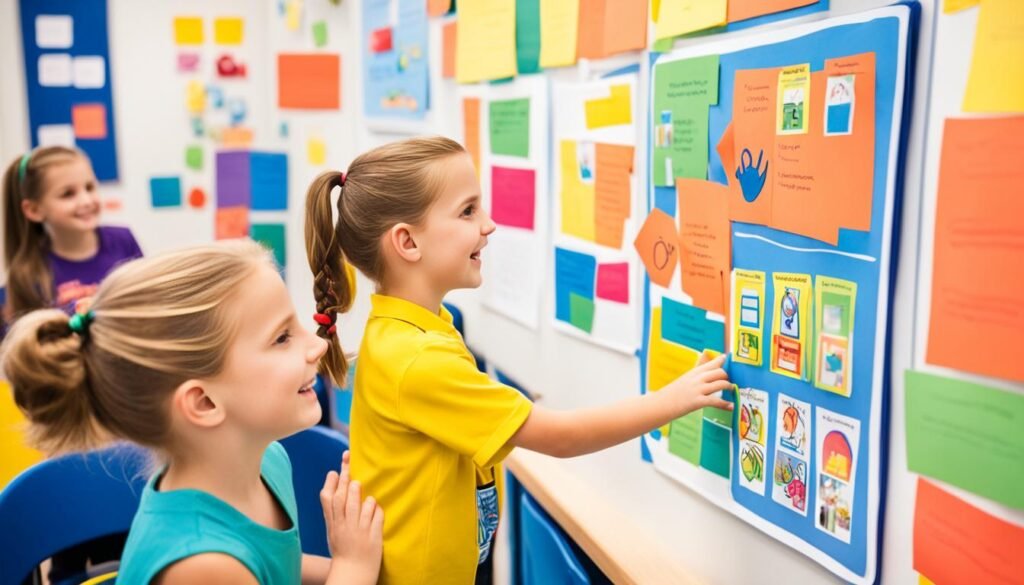
Educational psychology plays a crucial role in shaping learning environments and optimizing educational practices. By studying various factors such as age, culture, and environment, educational psychologists gain valuable insights into effective teaching methods, classroom management approaches, and the integration of educational technology. This knowledge helps create supportive and engaging learning environments that enhance student achievement and promote positive outcomes.
Informing Teaching Methods
Educational psychology provides educators with evidence-based strategies for maximizing learning outcomes. By understanding how students acquire knowledge and skills, teachers can tailor their instructional approaches to cater to diverse learning styles and preferences. Educational psychologists analyze different teaching methodologies and identify the most effective techniques for facilitating learning. This includes incorporating active learning strategies, promoting critical thinking, and leveraging educational technology to enhance engagement and knowledge retention.
Enhancing Classroom Management
Effective classroom management is essential for creating a positive and productive learning environment. Educational psychology offers insights into strategies that promote a cohesive classroom culture, minimize disruptions, and foster a sense of belonging among students. Classroom management techniques include establishing clear expectations, implementing consistent consequences, and utilizing positive reinforcement to motivate students. By applying principles of educational psychology, teachers can create a safe and supportive atmosphere that facilitates optimal learning.
“Good classroom management is an essential element of effective teaching. It sets the foundation for positive student-teacher relationships, establishes a conducive learning environment, and enables focused instruction.” – Dr. Jane Simmons, Educational Psychologist
Integrating Educational Technology
Educational technology has revolutionized the learning experience by providing interactive and engaging tools for instruction. Educational psychologists analyze the impact of technology on learning outcomes and guide educators in effectively integrating digital resources into their teaching practices. They help identify appropriate educational software, apps, and online platforms that enhance student engagement, facilitate personalized learning, and support individual student needs. Technology integration, when informed by educational psychology, can significantly enhance the learning experience.
Motivating Students
Student motivation is a key factor in academic success. Educational psychologists study various theories of motivation and identify strategies to inspire and engage students in their learning journey. By understanding the intrinsic and extrinsic motivators that influence student behavior, teachers can design learning experiences that foster a growth mindset, encourage self-regulation, and promote a love of learning. Educational psychology equips educators with the tools to inspire and empower students to reach their full potential.
The influence of educational psychology on learning environments is significant, as it guides the development of effective teaching methods, classroom management techniques, the integration of educational technology, and the motivation of students. By incorporating the insights gained from educational psychology research and theory, educators can create engaging and supportive learning environments that nurture student learning and growth.
Career Paths in Educational Psychology

Educational psychology offers a variety of exciting and fulfilling career paths for individuals passionate about understanding and improving the learning process. With their expertise in human behavior and cognitive processes, educational psychologists play a crucial role in enhancing teaching methods, curriculum development, and the overall educational experience.
Research
Many educational psychologists choose to pursue research positions where they can contribute to advancements in the field. By working in universities, government research centers, or educational organizations, these professionals conduct studies and analyze data to gain valuable insights into learning and instructional strategies. Their research findings help inform evidence-based practices and shape educational policies.
Teaching
For those who enjoy sharing knowledge and inspiring students, a career in teaching is an excellent option. Educational psychologists can become teachers or professors, providing instruction in the field of educational psychology. By teaching aspiring educators, they equip future professionals with the necessary knowledge and skills to create effective and inclusive learning environments.
School Counseling
Some educational psychologists choose to specialize in school counseling, working directly with students to support their academic, social, and emotional well-being. As school counselors, they implement strategies and interventions to address various challenges faced by students. Whether it’s providing guidance on career paths, facilitating conflict resolution, or supporting mental health, educational psychologists in this role have a direct and meaningful impact on students’ lives.
Educational Administration
For educational psychologists interested in influencing educational policies and practices at a broader level, a career in educational administration may be a suitable path. These professionals take on leadership roles in educational institutions, school districts, or educational organizations. They collaborate with stakeholders to develop and implement innovative strategies for improving teaching and learning outcomes, shaping educational programs, and ensuring the success of all students.
Career Paths Overview
| Career Path | Description |
|---|---|
| Research | Conducting research in universities, research centers, or educational organizations to advance knowledge and inform evidence-based practices. |
| Teaching | Providing instruction in educational psychology to aspiring educators, equipping them with effective teaching strategies. |
| School Counseling | Working directly with students to provide guidance and support for their academic and emotional needs. |
| Educational Administration | Leading educational institutions or organizations to shape policies, programs, and practices. |
As educational psychology continues to evolve and emphasize the importance of individualized learning, there are numerous opportunities for growth and impact in this field. Whether pursuing research, teaching, school counseling, or educational administration, educational psychologists contribute to creating inclusive and effective learning environments that empower students and promote their success.
Education and Training in Educational Psychology

A career in educational psychology requires a solid educational foundation. Most educational psychologists start by earning a bachelor’s degree in psychology or a related field. This provides a fundamental understanding of human behavior and psychological principles that form the basis of educational psychology.
After completing a bachelor’s degree, many aspiring educational psychologists choose to pursue a master’s degree in educational psychology or a specialized area within the field. A master’s degree allows individuals to delve deeper into educational theories and research, gaining practical knowledge and skills necessary for working in educational settings.
For those looking to further elevate their research and professional expertise, a doctoral degree is an option. Pursuing a Ph.D. or an Ed.D. in educational psychology can open doors to advanced research opportunities and leadership positions in academia, research institutions, or educational organizations.
Obtaining a license as an educational psychologist may be necessary, depending on the state and specific role. Licensing requirements typically involve completing a certain number of supervised practice hours, passing a licensing examination, and meeting any additional criteria set by the state licensing board. Additional certifications or licensure may also be required for specialized roles within educational psychology, such as school counseling.
Continuing education and professional development play an essential role in the field of educational psychology. Educational psychologists often engage in ongoing learning, attend conferences, and participate in workshops to stay up to date with the latest research and best practices in the field.
Also Read: Earn Your Bachelor Of Science In Education Today
Conclusion
Educational psychology is a crucial field that plays a vital role in understanding the learning process and improving educational outcomes. By exploring human behavior and cognitive processes, educational psychologists provide valuable insights into effective teaching methods, curriculum development, and the creation of learning environments that foster growth and success.
With a deep understanding of how people learn, educational psychologists contribute to educational practices that enhance the learning experience for students of all ages. Whether through research, teaching, school counseling, or educational administration, professionals in this field have numerous career opportunities to make a lasting impact on education.
By integrating the principles of educational psychology into teaching and learning, educators can create engaging and effective instructional strategies. Furthermore, the application of educational psychology is crucial for designing inclusive learning environments that meet the diverse needs of learners, ensure student motivation, and promote academic success. The field of educational psychology offers diverse and rewarding career opportunities for those passionate about making a positive difference in education.
FAQs
What is educational psychology?
Educational psychology is a field that studies how learners and learning contexts are influenced by various factors such as age, culture, and environment. It applies educational theory and research to understand the emotional, cognitive, and social aspects of human learning.
What are the key theories in educational psychology?
The main theories in educational psychology include behaviorism, cognitivism, constructivism, experientialism, and social contextual learning theories. These theories provide valuable insights into how people learn and inform educational practice.
What is behaviorism in educational psychology?
Behaviorism is a theory in educational psychology that focuses on observable behavior and the influence of environmental stimuli. Key theorists in behaviorism include Edward Thorndike, Ivan Pavlov, John B. Watson, and B.F. Skinner. Behaviorist learning theory suggests that learning is a result of the association between stimuli and behaviors.
What is cognitivism in educational psychology?
Cognitivism is a theory in educational psychology that examines the mental processes involved in learning and knowledge acquisition. Key theorists in cognitivism include Jean Piaget, Jerome Bruner, Robert Mills Gagne, and others. Cognitivism emphasizes the importance of understanding how learners think and process information.
What is constructivism in educational psychology?
Constructivism is a theory in educational psychology that emphasizes learners actively constructing their knowledge based on their experiences, prior knowledge, and social and cultural influences. Key theorists in constructivism include John Dewey, Jean Piaget, Lev Vygotsky, and Jerome Bruner.
What is experientialism in educational psychology?
Experientialism in educational psychology emphasizes the role of personal experiences in learning. It holds that learners construct knowledge and meaning through their own experiences. This learner-centered approach focuses on creating meaningful learning experiences that connect to the learner’s prior knowledge and interests.
What are social contextual learning theories in educational psychology?
Social contextual learning theories in educational psychology explore how social and cultural factors influence learning. These theories recognize that learning is a social and contextual process and emphasize the importance of collaborative learning, cultural diversity, and social interactions in shaping the learning experience.
What is the role of educational psychologists?
Educational psychologists have diverse career paths, including roles as researchers, consultants, teachers, and curriculum developers. They contribute to the field of educational psychology through conducting research, providing consulting services to schools and organizations, teaching, and designing instructional materials.
How does educational psychology influence learning environments?
Educational psychology informs teaching methods, classroom management approaches, and the integration of educational technology. Educational psychologists study how factors such as age, culture, and environment shape learning, and they provide insights into effective teaching strategies, student motivation, and classroom management techniques.
What are the career paths in educational psychology?
Educational psychologists can pursue research positions, teaching roles, or become school counselors or educational administrators. They have opportunities to work in universities, government research centers, educational organizations, and schools.
What education and training are required to become an educational psychologist?
A career in educational psychology typically requires a solid educational foundation. Most educational psychologists hold a bachelor’s degree in psychology or a related field, followed by a master’s degree in educational psychology or a specialized area. Some may choose to pursue a doctoral degree, such as a Ph.D. or an Ed.D., to enhance their research and professional expertise.
How does educational psychology impact the learning process?
By studying human behavior and cognitive processes, educational psychologists provide valuable insights into teaching methods, curriculum development, and the design of effective learning environments. They contribute to enhancing the educational experience and preparing individuals for success in various educational settings.
Source Links
- https://www.verywellmind.com/what-is-educational-psychology-2795157
- https://www.thechicagoschool.edu/insight/psychology/what-do-educational-psychologists-do/
- https://www.psychology.org/resources/educational-psychology-theories/




